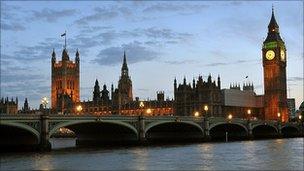Coalition defeated in Lords over fixed-term Parliaments
- Published

The next election is currently scheduled to be held on 7 May 2015
The government has been defeated in the Lords over plans that would determine the dates of future general elections.
Ministers are proposing a law which would see elections staged every five years under fixed-term Parliaments.
They argue the step would create greater certainty and remove the power of the prime minister to call an election whenever they wanted.
But peers said parliaments after the current one could not be bound by the plan. The government lost by six votes.
MPs will have the opportunity to overturn the amendment to the Fixed Terms Bill when it returns to the Commons.
'Permanent change'
The defeat will not alter government plans to hold the next general election on 7 May 2015 - at the end of the current planned five-year term.
During the debate, peers argued that parliaments after the current one should have to pass a resolution should they wish to continue with the fixed-term law.
Several, including former Cabinet Secretary Lord Butler, argued the coalition did not have a mandate to "bind" future parliaments.
"The government have a perfect right to commit themselves to a fixed-term for the current parliament provided they continue to maintain the confidence of the House of Commons," Lord Butler said.
"Certainly they do not have the right to make a permanent change to our constitution to meet the convenience of a temporary coalition."
The bill had been rushed through and needed further consideration, he added.
Election timing
But Lib Dem Lord Tyler said the amendment would "undermine" the entire bill.
He said the legislation was intended to enshrine the "principle of fixed-term parliaments for the long term" and future parliaments would still have the power to repeal it if they so chose.
"The bill will ensure that the power to dictate the timing of elections is removed from the prime minister of the day," he argued.
At the end of the debate, peers backed the amendment to the bill by 190 votes to 184.
Parliaments are currently limited to a maximum of five years, but the prime minister is free to call a general election at any time.
The government has argued that fixed terms would eliminate the power of the executive to call elections when it was politically convenient.
Under the bill, an election could still be triggered before the end of a five-year term if a motion of no confidence was passed in the government and no alternative administration could be formed, or if at least two-thirds of MPs approved calls for an early election.
On Tuesday peers rejected Labour proposals to set the length of the current parliament at four rather than five years and limit future parliaments to four years.
- Published7 September 2010
- Published16 November 2010